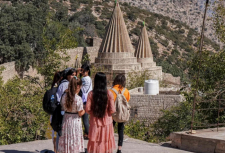The study of "ezdiki" in scientific circles

Science in this matter is also not free from ideology. In Armenia, orientalists use the name "ezdiki", which throws a stone in the direction of many Kurdologists. Western scholars never mention "ezdiki" and always describe the Yazidis as Kurds. This is since Western scientists in their field research came into contact mainly with nationalist-minded Kurds and were influenced by Kurdish nationalism, which is still relevant today. And they can be blamed for this because the task of scientists is to understand how the Yazidis really describe their language, how they identify themselves and how they present themselves, which will give their research even more value.
Today, the linguonym "ezdiki" is used mainly by Yazidis of the former Soviet Union, but it is also gaining popularity among the Yazidi diaspora in Germany and in some parts of Iraq. Interestingly, in the past, not only the Soviet Yazidis used this linguonym. The accusations that the Yazidis invented the name "ezdiki" to separate themselves ethnically from the Kurds and that the state contributed to this do not stand up to criticism. The anthropologist Ernest Chantre, in 1895, during a field visit to Birejik (Turkey), notes: "Both speak Kurmanji. The Yazidis call their language " Zyman e ezda "(the Yazidi language) and they claim that it is the Kurds who speak their language." (Ernest Chantre "Ethnographic notes on the Yazidis", 1895).
As an example of early development, we can cite Arab Shamilov. He came from a family of sheikhs and is known as the author of the first novel in Kurmanji. As early as 1926, Shamilov wrote in an article for a Russian-language Soviet newspaper: "Two Yezidi villages, Bolshoy and Maly Mirak, have started building a school for 80 students. Classes at the school will be held in the Yazidi language." Here the writer is talking about the Yazidi language. In the following years, until the collapse of the USSR, the name "Yazidi language" disappears from use, and the Yazidis themselves use the name "Kurmanji". And the reason for this lies in the Stalinist national policy, which was implemented in the 1930s.
Thus, the Yazidis did not want to use the name "Kurmanji "for their native language, preferring the" Yazidi language " (Ezdiki). It is not surprising that the source is deliberately ignored by nationalist Kurdish circles. And science also deliberately hides such sources to this day – there is no other explanation for this.
Undoubtedly, many Yazidis used and still use the term "Kurmanji". For Kurds and Yazidis, the use of the term "Kurd" has become active in recent decades, thanks to Kurdish TV stations that have pushed a nationalist agenda to the forefront. Previously, everyone used "kurmanji" instead of this term. Today, the Kurds consider "Kurmanji" only a dialect of the Kurdish language, which includes, among other things, such dialects as Sorani and Zazaki. But there is no obvious etymological connection between the terms "Kurmanji" and "Kurd". Attempts to establish such a connection have so far led to various theories, some of which contradict each other. According to Mackenzie's theory, kurmanji is derived from the words "kurd" and "manj" (derived from the Mussel). Another theory claims that "kurmanji" comes from the name of the city of Kermanshah.
It is also interesting to note that a significant proportion of Yazidis still use the term "Kurmanj" about the Kurds. This has historical and ethno-religious reasons that can hardly be felt in our minds.
Tags: #yazidisinfo #newsyazidi #ezidi #aboutyazidi #ezdikilanguage
The study of "ezdiki" in scientific circles

Science in this matter is also not free from ideology. In Armenia, orientalists use the name "ezdiki", which throws a stone in the direction of many Kurdologists. Western scholars never mention "ezdiki" and always describe the Yazidis as Kurds. This is since Western scientists in their field research came into contact mainly with nationalist-minded Kurds and were influenced by Kurdish nationalism, which is still relevant today. And they can be blamed for this because the task of scientists is to understand how the Yazidis really describe their language, how they identify themselves and how they present themselves, which will give their research even more value.
Today, the linguonym "ezdiki" is used mainly by Yazidis of the former Soviet Union, but it is also gaining popularity among the Yazidi diaspora in Germany and in some parts of Iraq. Interestingly, in the past, not only the Soviet Yazidis used this linguonym. The accusations that the Yazidis invented the name "ezdiki" to separate themselves ethnically from the Kurds and that the state contributed to this do not stand up to criticism. The anthropologist Ernest Chantre, in 1895, during a field visit to Birejik (Turkey), notes: "Both speak Kurmanji. The Yazidis call their language " Zyman e ezda "(the Yazidi language) and they claim that it is the Kurds who speak their language." (Ernest Chantre "Ethnographic notes on the Yazidis", 1895).
As an example of early development, we can cite Arab Shamilov. He came from a family of sheikhs and is known as the author of the first novel in Kurmanji. As early as 1926, Shamilov wrote in an article for a Russian-language Soviet newspaper: "Two Yezidi villages, Bolshoy and Maly Mirak, have started building a school for 80 students. Classes at the school will be held in the Yazidi language." Here the writer is talking about the Yazidi language. In the following years, until the collapse of the USSR, the name "Yazidi language" disappears from use, and the Yazidis themselves use the name "Kurmanji". And the reason for this lies in the Stalinist national policy, which was implemented in the 1930s.
Thus, the Yazidis did not want to use the name "Kurmanji "for their native language, preferring the" Yazidi language " (Ezdiki). It is not surprising that the source is deliberately ignored by nationalist Kurdish circles. And science also deliberately hides such sources to this day – there is no other explanation for this.
Undoubtedly, many Yazidis used and still use the term "Kurmanji". For Kurds and Yazidis, the use of the term "Kurd" has become active in recent decades, thanks to Kurdish TV stations that have pushed a nationalist agenda to the forefront. Previously, everyone used "kurmanji" instead of this term. Today, the Kurds consider "Kurmanji" only a dialect of the Kurdish language, which includes, among other things, such dialects as Sorani and Zazaki. But there is no obvious etymological connection between the terms "Kurmanji" and "Kurd". Attempts to establish such a connection have so far led to various theories, some of which contradict each other. According to Mackenzie's theory, kurmanji is derived from the words "kurd" and "manj" (derived from the Mussel). Another theory claims that "kurmanji" comes from the name of the city of Kermanshah.
It is also interesting to note that a significant proportion of Yazidis still use the term "Kurmanj" about the Kurds. This has historical and ethno-religious reasons that can hardly be felt in our minds.
Tags: #yazidisinfo #newsyazidi #ezidi #aboutyazidi #ezdikilanguage


























